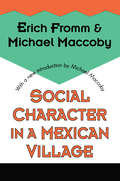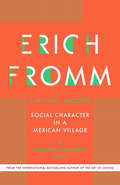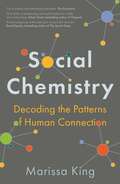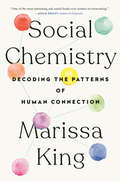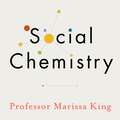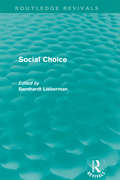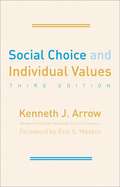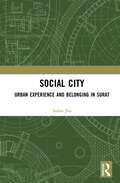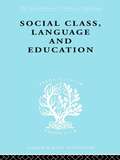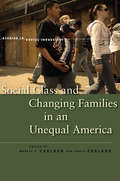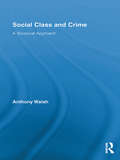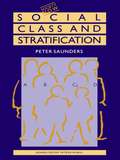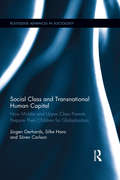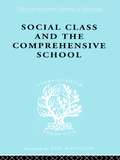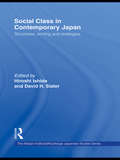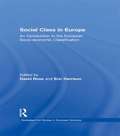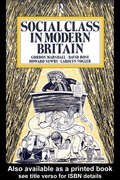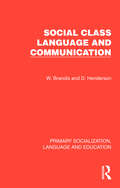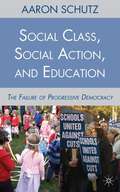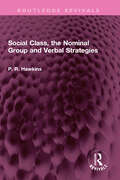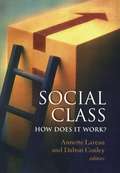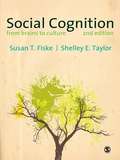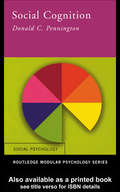- Table View
- List View
Social Character in a Mexican Village: A Sociopsychoanalytic Study
by Erich Fromm Michael MaccobyAfter the completion of the revolution in 1920, Mexico quickly became an increasingly industrialized country. The vast changes that occurred in the first fifty years after the revolution inspired Erich Fromm and Michael Maccoby to find out how the Mexican people were adapting. The result, Social Character in a Mexican Village, provides a new approach to the analysis of social phenomena.The authors applied Fromm's theories of psychoanalysis to the study of groups. They devised an ingenious method of questionnaires, which, combined with direct observation, clearly revealed the psychic forces that motivated the peasant population. In his new introduction, Michael Maccoby thoroughly explains the basis of the study, how it originated, and how it was carried out. He goes on to delineate the results and determine their impact on the present day. Social Character in a Mexican Village throws new light on one of the world's most pressing problems, the impact of the industrialized world on the traditional character of the peasant. This ground-breaking work will be invaluable to the work of sociologists, anthropologists, and psychoanalysts.
Social Character in a Mexican Village: A Sociopsychoanalytic Study
by Erich Fromm&“[A] groundbreaking study combining psychoanalytical and anthropological methods to analyse the impact of industrialization on &‘peasants.&’&” —Booknews The renowned psychoanalyst Erich Fromm analyzed more than just general society and societal processes. Together with Michael Maccoby, he completed a study of Mexican villagers to empirically illustrate how historical, economic, and social requirements determine behavior.Social Character in a Mexican Village does much more than introduce a new approach to the analysis of social phenomena. It throws new light on one of the world&’s most pressing problems, the impact of the industrialized world on the traditional character of the laboring class. Unanimously, the book is an outstanding introduction to Fromm&’s concept of social character. &“Fromm and Maccoby have written a study of crucial importance.&” —Richard J. Barnet, Institute for Policy Studies
Social Chemistry: Decoding the Patterns of Human Connection
by Marissa King'full of wisdom and entertaining anecdotes' The Economist'fascinating' Financial Times Social Chemistry will utterly transform the way you think about 'networking.' Understanding the contours of your social network can dramatically enhance personal relationships, work life, and even your global impact. Are you an Expansionist, a Broker, or a Convener? The answer matters more than you think. . . . One of 2021's Most Highly Anticipated New Books--Newsweek One of The 20 New Leadership Books--Adam GrantOne The Best New Wellness Books Hitting Shelves In January--Shape.com A Next Big Idea Club Nominee__________Conventional wisdom would have us believe that it is the size of your network that matters: how many people do you know? We're told to mix, mingle, and connect.But social science research suggests otherwise. The quality and structure of our relationships have far greater impact on our personal and professional lives. our relationships with friends, family, co-workers, neighbours, and collaborators are by far our greatest asset. Yet, most people leave them to chance.In this ground-breaking study, Marissa King, Professor of Organizational Behavior at the Yale, argues that there are strategic ways in which we can alter our relationships for a happier and more fulfilling life. With new understanding, this book can help readers to see how they can harness the power of their networks in their personal relationships, at work, and to create a better world.
Social Chemistry: Decoding the Patterns of Human Connection
by Marissa KingNext Big Idea Club Nominee Fall 2020Social Chemistry will utterly transform the way you think about &“networking.&” Understanding the contours of your social network can dramatically enhance personal relationships, work life, and even your global impact. Are you an Expansionist, a Broker, or a Convener? The answer matters more than you think. . . . Yale professor Marissa King shows how anyone can build more meaningful and productive relationships based on insights from neuroscience, psychology, and network analytics. Conventional wisdom says it's the size of your network that matters, but social science research has proven there is more to it. King explains that the quality and structure of our relationships has the greatest impact on our personal and professional lives. As she shows, there are three basic types of networks, so readers can see the role they are already playing: Expansionist, Broker, or Convener. This network decoder enables readers to own their network style and modify it for better alignment with their life plans and values. High-quality connections in your social network strongly predict cognitive functioning, emotional resilience, and satisfaction at work. A well-structured network is likely to boost the quality of your ideas, as well as your pay. Beyond the office, social connections are the lifeblood of our health and happiness. The compiled results from dozens of previous studies found that our social relationships have an effect on our likelihood of dying prematurely—equivalent to obesity or smoking. Rich stories of Expansionists like Vernon Jordan, Brokers like Yo-Yo Ma, and Conveners like Anna Wintour, as well as personal experiences from King's own world of connections, inform this warm, engaging, revelatory investigation into some of the most consequential decisions we can make about the trajectory of our lives.
Social Chemistry: Decoding the Patterns of Human Connection
by Marissa KingSocial Chemistry will utterly transform the way you think about 'networking.' Understanding the contours of your social network can dramatically enhance personal relationships, work life, and even your global impact. Are you an Expansionist, a Broker, or a Convener? The answer matters more than you think. . . . Conventional wisdom would have us believe that it is the size of your network that matters: how many people do you know? We're told to mix, mingle, and connect.But social science research suggests otherwise. The quality and structure of our relationships have far greater impact on our personal and professional lives. our relationships with friends, family, co-workers, neighbours, and collaborators are by far our greatest asset. Yet, most people leave them to chance.In this ground-breaking study, Marissa King, Professor of Organizational Behavior at the Yale, argues that there are strategic ways in which we can alter our relationships for a happier and more fulfilling life. With new understanding, this book can help readers to see how they can harness the power of their networks in their personal relationships, at work, and to create a better world.(P)2021 Penguin Random House Audio
Social Choice (Routledge Revivals #Vol. 1)
by Bernhardt LiebermannFirst published in 1971, Social Choice is both a text and reference containing the proceedings of a conference dealing with contemporary work on the normative and descriptive aspects of the social choice problem. This reissue will be of interest to advanced undergraduate and graduate courses on group decision making and social choice. Economists, social psychologists, political scientists and sociologists will welcome this valuable work.
Social Choice and Individual Values
by Kenneth J. Arrow Eric S. MaskinOriginally published in 1951,Social Choice and Individual Valuesintroduced “Arrow’s Impossibility Theorem” and founded the field of social choice theory in economics and political science. This new edition, including a new foreword by Nobel laureate Eric Maskin, reintroduces Arrow’s seminal book to a new generation of students and researchers. "Far beyond a classic, this small book unleashed the ongoing explosion of interest in social choice and voting theory. A half-century later, the book remains full of profound insight: its central message, ‘Arrow’s Theorem,’ has changed the way we think. ”—Donald G. Saari, author ofDecisions and Elections: Explaining the Unexpected
Social Citizenship and Workfare in the United States and Western Europe
by Joel F. HandlerThis book compares workfare policies in the United States and 'active labor policies' in Western Europe that are aimed primarily at the long-term unemployed, unemployed youth, lone parents, immigrants and other vulnerable groups often referred to collectively as the 'socially excluded'. The Europeans maintain that workfare is the best method of bringing the socially excluded back into mainstream society. Although there are differences in terms of ideology and practice, Joel F. Handler argues that there are also significant similarities, especially field-level practices that serve to exclude those who are the least employable or lack other qualifications that agencies favor. The author also examines strategies for reform, including protective labor legislation, the Open Method of Coordination, the reform of social and employment services, and concludes with an argument for a basic income guarantee, which would not only alleviate poverty but also provide clients with an exit option.
Social City: Urban Experience and Belonging in Surat
by Sadan JhaThis book examines urban experience from the vantage point of the global South. Drawing upon narratives coming from three key axes — communities, neighbourhoods, and market-places — it lays bare the specificities of urban experience coming from a non-megacity landscape of South Asia. It discusses a host of issues including ambiguity of urban experience, its uncomfortable ties with frames of the capital, and the politics of urban belonging that operate at multiple levels shaping the contours of urban society. Musing on the subjectivities pertaining to the social and the spatial in a milieu of a fast-transforming urban landscape of Surat, Gujarat, the book is an exploration of how people perceive and associate with their surroundings, how do they aspire, how do they stigmatise others, the relation between city and its migrants, between city and its castes, and at a broader level between the capital and the city from a location in the global South. An important contribution to the study of cities, the volume sheds light on how urban experience can be approached as a socially and spatially embedded concept. It will be of great interest to scholars and researchers of social history, urban sociology, political theory, Global South studies and South Asian studies.
Social Class Language and Education (International Library of Sociology #Vol. 15)
by Denis LawtonTitles in the Class, Race and Social Structure set of the International Library of Sociology consider every problem of socio-political importance that affected society in the years following the Second World War.
Social Class and Changing Families in an Unequal America
by Marcia J. Carlson Paula EnglandAmerican families are far more diverse and complex today than they were 50 years ago. As ideas about marriage, divorce, and remarriage have changed, so too have our understandings about cohabitation, childbearing, parenting, and the transition to adulthood. Americans of all socioeconomic backgrounds have witnessed changes in the nature of family life, but as this book reveals, these changes play out in very different ways for the wealthy or well off than they do for the poor. Social Class and Changing Families in an Unequal Americaoffers an up-to-the-moment assessment of the condition of the family in an era of growing inequality. Highlighting unique aspects of family behavior, it reveals the degree to which families' varying experiences are shaped by social class. This book offers a much needed assessment of contemporary family life amid the turbulent economic changes in the United States.
Social Class and Crime: A Biosocial Approach (Routledge Advances in Criminology)
by Anthony WalshSocial class has been at the forefront of sociological theories of crime from their inception. It is explicitly central to some theories such as anomie/strain and conflict, and nips aggressively at the periphery of others such as social control theory. Yet none of these theories engage in a systematic exploration of what social class is, how individuals come to be placed in one rung of the class ladder rather than another, or the precise nature of the class-crime relationship. This book avers that the same factors that help to determine a person’s class level also help to determine that person’s risk for committing criminal acts. Social class is a modern outcome of primordial status-striving and requires explanation using the modern tools of genetics, neurobiology, and evolutionary biology, and this is what this book does. Many aspects of criminal behavior can be understood by examining the shared factors that lead to the success or failure in the workplace and to pro- or antisocial activities. A biosocial approach requires reducing sociology’s “master variable” to a lower level analysis to examine its constituent parts, which is resisted by many criminologists as highly controversial. However, this book makes plain that the more we know about the nature side of behavior the more important we find the nurture side to be. It makes clear how the class/crime relationship and criminology in general, can benefit from the biosocial perspective; a perspective that many criminological luminaries expect to be the dominant paradigm for the twenty first century.
Social Class and Educational Inequality: The Impact of Parents and Schools
by Iram Siraj Aziza MayoSocial class is often seen as an intractable barrier to success, yet a number of children from disadvantaged backgrounds still manage to show resilience and succeed against the odds. This book presents the findings from fifty Child and Family Case Studies (CFCS) conducted with 13–16 year olds. The authors look specifically at the roles that people and experiences - at home, in schools and in the wider community - have played in the learning life-courses of these children; how these factors have affected their achievement; and explanations and meanings given by respondents to the unique characteristics, experiences and events in their lives. Featuring the voices of real parents and children, and backed up by a decade of quantitative data, this is a compelling record that will help readers to understand the complex nature of social disadvantage and the interplay between risk and protective factors in homes and schools that can make for a transformational educational experience.
Social Class and Stratification
by Peter SaundersThe questions raised by a study of class and inequality are important, but often complex. This book succeeds in making them understandable without oversimplifying, and its breadth, originality, and easy style will appeal to a wide readership. Peter Saunders covers theories of social class as well as evidence on class inequalities in the contemporary period. He analyses why class inequalities exist, whether they are inevitable, whether they are unjust, and how they are changing. The analysis is comprehensive and up-to-date and includes information on how the distribution of wealth and income and social mobility chances have been changing during the Thatcher years. It also explores how the class structure is being affected by developments such as the spread of privatization and individual shareholdings, the rise of the 'yuppies', and the emergence of an underclass. On the theoretical side Professor Saunders gives equal weight to marxist, social-democratic, and neo-liberal perspectives on class and inequality, and writers as diverse a Karl Marx, John Rawls, and Friedrich Hayek all receive serious and balanced consideration.
Social Class and Transnational Human Capital: How Middle and Upper Class Parents Prepare Their Children for Globalization (Routledge Advances in Sociology)
by Jürgen Gerhards Sören Carlson Hans SilkeDue to globalization processes, foreign language skills, knowledge about other countries and intercultural competences have increasingly become important for societies and people’s social positions. Previous research on social inequality, however, has dominantly focused on the reproduction of class structures within the boundaries of a particular nation-state without considering the importance of these specific skills and competences. Within Social Class and Transnational Human Capital authors Gerhards, Hans and Carlson refer to these skills as ‘transnational human capital’ and ask to what extent access to this increasingly sought-after resource depends on social class. Based on Pierre Bourdieu’s theory of class, they investigate this question via both quantitative and qualitative empirical analyses. In doing so the authors focus, among other examples, on the so-called school year abroad, i.e. students spending up to a year abroad while attending school – a practice which is rather popular in Germany, but also quite common in many other countries. Thus, this insightful volume explores how inequalities in the acquisition of transnational human capital and new forms of social distinction are produced within families, depending on their class position and the educational strategies parents pursue when trying to prepare their children for a globalizing world. An enlightening title, this book will appeal to undergraduate and postgraduate students, as well as postdoctoral researchers interested in fields such as sociology, social inequality research, globalization studies and educational studies.
Social Class and the Comprehensive School (International Library of Sociology #Vol. 22)
by Dr Julienne Ford Julienne FordDrawing on the great wealth of knowledge and experience of educational practitioners and theorists, the volumes in The Sociology of Education set of the International Library of Sociology explore the very important relationship between education and society. These books became standard texts for actual and intending teachers. Drawing upon comparative material from Israel, France and Germany, titles in this set also discuss the key questions of girls' and special needs education, and the psychology of education.
Social Class in Contemporary Japan: Structures, Sorting and Strategies (Nissan Institute/Routledge Japanese Studies)
by Hiroshi Ishida David H. SlaterPost-war Japan was often held up as the model example of the first mature industrial societies outside the Western economy, and the first examples of "middle-mass" society. Today, and since the bursting of the economic bubble in the 1990’s, the promises of Japan, Inc., seem far away. Social Class in Contemporary Japan is the first single volume that traces the dynamics of social structure, institutional socialization and class culture through this turbulent period, all the way into the contemporary neoliberal moment. In an innovative multi-disciplinary approach that include top scholars working on quantitative class structure, policy development, and ethnographic analysis, this volume highlights the centrality of class formation to our understanding of the many levels of Japanese society. The chapters each address a different aspect of class formation and transformation which stand on their own. Taken together, they document the advantages of putting Japan in the broad comparative framework of class analysis and the enduring importance of social class to the analysis of industrial and post-industrial societies. Written by a team of contributors from Japan, the US and Europe this book will be invaluable to students and scholars of Japanese society and culture, as well as those interested in cultural anthropology and social class alike.
Social Class in Europe: An introduction to the European Socio-economic Classification (Studies in European Sociology)
by David Rose Eric HarrisonThis timely volume introduces a new social class schema, the European Socio-economic Classification (ESeC), which has been specifically developed and tested for use in EU comparative research. Social Class in Europe aims to introduce researchers to the new classification and its research potential. Since socio-economic classifications are so widely used in official and academic research, this collection is essential reading for all users of both government and academic social classifications. While primarily aimed at researchers who will be using the ESeC, the book’s contents will also have a wider appeal as it is suitable for students taking substantive courses in European studies or as a supplementary text for undergraduates studying the EU, Sociology and Economics. Because of its inherent methodological interest, the book should prove a valuable tool for undergraduate and graduate courses that discuss how social scientists construct and validate basic measures. It will also be required reading for policy makers and analysts concerned with social inequality and social exclusion across Europe.
Social Class in Modern Britain
by David Rose Gordon Marshall Howard Newby Carol VoglerThe book incorporates three alternative conceptions of class. Erik Olin Wright's structural Marxist account is set alongside John Goldthorpe's occupational class schema, and the Registrar-General's prestige and skill-related categories. The authors use their unique data on inequality and conflict in contemporary Britain to provide, for the first time, a rigourous comparison of Marxist, sociological and official class frameworks. The book ranges widely across such topics as sectionalism in the workforce; privatism of families and individuals; fatalism; gender and class processes; sectoral production and consumption cleavages. The authors conclude that class is still crucial in structuring economic, political and social life.
Social Class, Language and Communication (Primary Socialization, Language and Education)
by D. Henderson W. BrandisOriginally published in 1970, Social Class, Language and Communication explores the different effects of parental social class, the ability and sex of the child and a measure of the mother’s reported communication to her child, upon aspects of five-year-old children’s speech. The study shows the relationship between a measure of linguistic flexibility in children and their family’s social class position and includes the construction and application of an index of maternal communication and control. Today it can be read in its historical context.
Social Class, Social Action, and Education
by Aaron SchutzSchutz demonstrates that progressive ideas of democracy emerged out of the practices of a new middle class, reacting, in part, against the more conflictive social struggles of the working-class. The volume traces two distinct branches of democratic progressivism: collaborative and personalist.
Social Class, the Nominal Group and Verbal Strategies (Routledge Revivals)
by P R HawkinsFirst published in 1977, Social Class, the Nominal Group and Verbal Strategies reports on the results of a grammatical analysis of the speech of a large sample (about 300) of five-year-old middle- and working-class children. The author is concerned in particular to answer the questions: What is the relationship, within certain restricted contexts, between the use of particular grammatical structures and factors such as social class, IQ and sex? How are any differences in the type or frequency of structures to be interpreted? The central part of the book presents the results of a set of correlations: the correlations of linguistic categories on the one hand, with sociological or ‘background’ categories on the other. The author then sets this study and its results in the perspective of related research and comments on some aspects of the ‘deficit-difference’ controversy. Finally, he presents his own conclusions in a detailed discussion. He argues that, instead of trying to ascertain the purely linguistic competence of children from different backgrounds, we must rather compare the different verbal strategies they use in a particular situation or context. The book will be of interest to students of language, linguistics, pedagogy and education.
Social Class: How Does It Work?
by Dalton Conley Annette LareauClass differences permeate the neighborhoods, classrooms, and workplaces where we lead our daily lives. But little is known about how class really works, and its importance is often downplayed or denied. In this important new volume, leading sociologists systematically examine how social class operates in the United States today. Social Class argues against the view that we are becoming a classless society. The authors show instead the decisive ways social class matters—from how long people live, to how they raise their children, to how they vote. The distinguished contributors to Social Class examine how class works in a variety of domains including politics, health, education, gender, and the family. Michael Hout shows that class membership remains an integral part of identity in the U.S.—in two large national surveys, over 97 percent of Americans, when prompted, identify themselves with a particular class. Dalton Conley identifies an intangible but crucial source of class difference that he calls the “opportunity horizon”—children form aspirations based on what they have seen is possible. The best predictor of earning a college degree isn’t race, income, or even parental occupation—it is, rather, the level of education that one’s parents achieved. Annette Lareau and Elliot Weininger find that parental involvement in the college application process, which significantly contributes to student success, is overwhelmingly a middle-class phenomenon. David Grusky and Kim Weeden introduce a new model for measuring inequality that allows researchers to assess not just the extent of inequality, but also whether it is taking on a more polarized, class-based form. John Goldthorpe and Michelle Jackson examine the academic careers of students in three social classes and find that poorly performing students from high-status families do much better in many instances than talented students from less-advantaged families. Erik Olin Wright critically assesses the emphasis on individual life chances in many studies of class and calls for a more structural conception of class. In an epilogue, journalists Ray Suarez, Janny Scott, and Roger Hodge reflect on the media’s failure to report hardening class lines in the United States, even when images on the nightly news—such as those involving health, crime, or immigration—are profoundly shaped by issues of class. Until now, class scholarship has been highly specialized, with researchers working on only one part of a larger puzzle. Social Class gathers the most current research in one volume, and persuasively illustrates that class remains a powerful force in American society.
Social Cognition
by Shelley Kathleen Taylor Susan FiskeIn Social Cognition: From Brains to Culture 2nd Edition, Fiske and Taylor carefully integrate the many new threads of social cognition research that have emerged in the intervening years since the previous edition, including developments within social neuroscience, cultural psychology and some areas of applied psychology, and continue to tell a powerful and comprehensive story about what social cognition is and why it's a significant phenomenon in society today. Every updated chapter now includes more figures and tables, glossary entries, and further readings. A supplemental test bank including some full-text journal articles corresponding to chapters in the book is available online at: www.sagepub.co.uk/fiskeandtaylor.<P><P> This textbook will be indispensable to students of social cognition and social psychology worldwide, at undergraduate or graduate level. <P> Visit the Companion Website at www.sagepub.co.uk/fiskeandtaylor
Social Cognition (Routledge Modular Psychology)
by Donald C. PenningtonSocial Cognition looks at the way in which humans interpret, analyse and remember information about the social world. Topics covered include: attribution, social schemas and social representations, prejudice and discrimination. Suitable for the AQA-A A2 and AQA-B AS level examintation, mnd students studying social cognition for the first time at undergraduate level.Series DetailsThe Routledge Modular Psychology Series is a completely new approach to introductory level psychology, tailor-made for the new modular style of teaching. Each book covers a topic in more detail than any large textbook can, allowing teacher and student to select material exactly to suit any particular course or project. Especially written for those students new to higher-level study, whether at school, college or university, the books include the following designed features to help with technique: Practice essays with specialist commentary to show how to achieve a higher grade Chapter summaries and summaries of key research Glossary and further reading Progress and review exercises.
